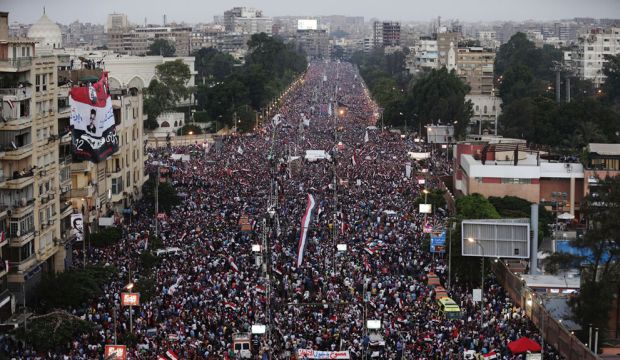
File photo showing Egyptian crowds protesting against former president Mohamed Mursi on June 30, 2013. (AP Photo/Hassan Ammar)
Cairo, Asharq Al-Awsat—Several Egyptian politicians have announced that they will contest upcoming parliamentary elections as part of a new coalition called the 25–30 Alliance.
At a news conference at the headquarters of the Egyptian Journalists’ Union on Sunday, former MP Mustafa El-Guindy said the new alliance would include a number of independent political figures who backed what he called the “revolutions” of January 25, 2011, and June 30, 2013, which, respectively, saw the downfall of former presidents Hosni Mubarak and Mohamed Mursi.
Sources within the newly formed alliance, speaking to Asharq Al-Awsat on condition of anonymity, said: “There are many bodies and public figures who have said they will join the alliance, including some members of the April 6 and Tamarod movements.”
The April 6 movement was highly active during and before the uprising which overthrew Mubarak in 2011, helping organize some of the protests which took place on the first day of what would become the January 25 revolution. The Tamarod (Rebellion) movement called for the ousting of Mursi in 2013, and helped organize the mass protests which eventually led to the Islamist president’s ouster.
The sources added that the Free Egyptians Party—a secular party founded in April 2011 by Egyptian businessman Naguib Sawiris—may also join the alliance after “announcing its withdrawal from Amr Moussa’s alliance.”
The sources also claimed that the Alliance included the “writer and adviser of the former [interim] president [Adly Mansour] on women’s affairs, Sakina Fouad, Professor Mohammed Ghoneim, a leading kidney surgeon in Egypt, Abdel-Hakim Gamal Abdel Nasser [son of the former president], and journalist Abdel-Halim Qandil, in addition to a number of public and independent figures.”
During the news conference, Guindy said: “The Alliance has put in place specific requirements for those wishing to run in the next parliamentary elections under its umbrella, chief of which is that every person wishing to run must sign the Egypt’s Future Document and provide a CV which includes the parliament committee which they would like to join and their vision on the amendment of at least three laws in their field of interest, in order to ensure a strong parliament with professional committees and members who are chosen according to competency.”
He added that the Alliance had allocated 25 percent of places to the youth and another 25 percent to women.
Egypt’s numerous political parties have recently formed a series of alliances to compete for seats in the upcoming parliamentary elections, the first since Egypt’s last parliament was dissolved in the summer of 2012.
So far, a number of alliances have formed aside from the 25–30 Alliance, most recently the Ummah Alliance announced by Amr Moussa, the head of the committee that drafted the country’s new constitution and a former foreign minister and Arab League chief.
The new Egyptian constitution states that parliamentary elections should be held within a period not exceeding six months after the date of the ratification of the constitution, which was completed in January.
The next parliament is expected to play a prominent role due to the new powers given to its members by the constitution, which at the same time reduced the powers of the president substantially.
As the constitutional deadline approaches, the process of preparing for elections for the new parliament continues. In June, the Egyptian Council of Ministers ratified two draft laws on the new parliament and the elections to choose its members. The laws state that of 567 members in total, 420 will be elected as individual candidates, 120 under a closed party list system, and the remaining 27 will be directly appointed by the president.
President Abdel-Fattah El-Sisi last week issued a decree to form the Higher Commission for Parliamentary Elections in preparation for the polls in the next few months.
A judicial source at the new body, speaking on condition of anonymity, said: “The Commission will convene on Monday to elect its secretary-general and draw the regulations which will govern the publicity campaigns, conditions of candidacy, the voting procedure, and the length of electoral campaigns.”
Meanwhile, Egypt’s Nour Party—one of the country’s largest, and the political wing of the Salafist Call movement—has denied reports suggesting it would not be running for the seats reserved for party lists seeking instead to field its candidates as independents.
A leading figure of the Nour Party, speaking on condition of anonymity, told Asharq Al-Awsat: “The Party has not made a final decision on which form it would choose to participate in the elections,” adding that Nour would fight for all seats and that it expected to win 30 percent of the total.
